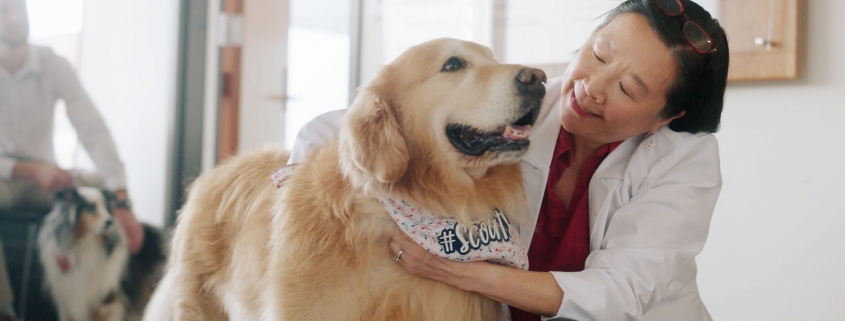BY MEGAN TREMELLING, DVM, LVS
There was a big game on TV this year. I didn’t see it, but I’ve heard that one of the commercials featured a beautiful Golden Retriever named Scout. Last year, Scout had a form of cancer called cardiac hemangiosarcoma. He was treated at the University of Wisconsin School of Veterinary Medicine. He is doing well, and his owner was so grateful that he paid for this ad in hopes people would donate money to the UW School of Veterinary Medicine. Apparently it is working quite well, and hundreds of thousands of dollars have been donated. It’s a very sweet story and a pleasant change from the usual headlines.
Hemangiosarcoma is unfortunately a very common cancer in dogs. Two of its commonest forms, splenic and cardiac, tend to be extremely aggressive. What typically happens is this: A middle-aged dog (a Golden Retriever as often as not) is happily going about their typical day when it suddenly starts to feel tired. Over a few minutes to a few hours, the dog goes from bouncing and playing to collapsed, unable to get up and gasping for breath. This is because hemangiosarcomas, which develop from the walls of blood vessels, have an unfortunate tendency to burst, causing internal bleeding that can be rapidly fatal.
If the hemangiosarcoma is in the heart (a cardiac hemangiosarcoma), the amount of blood lost is usually not extremely large, but it causes problems because of its location. A protective fibrous sac called the pericardium encloses the heart. When a tumor bleeds, it can fill up the pericardium and cause so much pressure that the heart cannot fill and pump properly. The term “pericardial effusion” refers to any fluid that is in the pericardium, and a bleeding tumor is not the only possible cause. We sometimes see effusions caused by inflammation or infection, bleeding disorders, heart disease and so on. Whatever caused it, if it is causing problems, we want to get it out of there. We do this by placing a long needle or catheter into the chest and into the pericardium to drain out as much fluid as possible, relieving the pressure on the heart so that it can fill properly.
Of course, having once solved that problem, we want to do our best to prevent it from coming back. Sometimes, analyzing the fluid will tell us about a cause, such as an infection, that we can treat. Most of the time, it is just blood, and that puts the owners and us in the uncomfortable position of trying to figure out what to do next. If the effusion is benign, meaning it is caused by inflammation rather than cancer, it may never come back again or may improve with medication. If it is caused by cancer, however, it will bleed again. It’s important to know what we’re up against.
A mass on the heart doesn’t show up well on x-rays, but sometimes a skilled ultrasonographer can identify it. We can also look for circumstantial evidence. Hemangiosarcoma is a cancer that is often found in several organs at once, so we look for it in the liver and spleen with an ultrasound exam or in the lungs with a chest x-ray. If we find masses in those organs, it makes diagnosis easier. Whether it has spread to other organs or not, cardiac hemangiosarcoma has a grave prognosis, with most patients surviving less than a month from diagnosis. Many owners elect to euthanize their pets at the time of diagnosis because the prognosis is poor even with treatment.
For those owners who decide to give cancer a fight, veterinarians, like medical doctors, have many tools to offer. Surgically removing some kinds of masses can be extremely successful, but surgery is rarely possible with cardiac tumors. Chemotherapy (medication to slow down or destroy cancer) is regularly administered by veterinarians and can be very beneficial for some types of cancers. In the case of hemangiosarcoma, it can extend average life expectancy up to 6-7 months. Some other forms of treatment are less routinely used and less well-studied by veterinarians due to issues with the cost, the availability and the advanced training required to use them. However, veterinary oncologists (cancer specialists) do have access to these tools. Here in Milwaukee, for example, we have access to stereotactic radiation therapy that allows the precise targeting of tumors with minimal damage to nearby healthy tissue. Our oncologists then use immunotherapy which works like a vaccination to help the patient’s own immune system fight the tumor.
A diagnosis of cardiac hemangiosarcoma is never a good thing, but Scout was very fortunate to have an owner with the resources and the drive to do anything that could be done to help his dog. Fortunately, Scout and his owner lived not far from Madison, where the UW School of Veterinary Medicine has an excellent oncology program. Scout was treated with chemotherapy, radiation therapy and immunotherapy. He is reportedly doing well at home for now. Treatment is not likely to cure him, but it is buying him quality time. His owner apparently was grateful for the care Scout had received and wanted the oncologists to be able to treat the disease more effectively, so he took out the ad soliciting donations for the veterinary school.
With his owner’s decision to take out the ad, everyone wins. The veterinary school obviously benefits from the donations. It wasn’t a bad choice for Scout’s owner either as this ad has attracted far more attention to his company than any traditional commercial touting its products.
And here’s the beauty of supporting veterinary cancer research: Dogs, it turns out, are excellent models for the study of cancer in humans. What we learn treating dogs with cancer can be useful when studying human disease and sometimes far more useful than other models such as mice.
There’s no final word on how much money has been raised as a result of the ad, but it is likely to be a substantial amount. Scout’s doctors, the veterinary oncologists you see in the ad, are brilliant research scientists and will put it to good use. I look forward to someday having more options to offer the many dogs that I see with hemangiosarcoma.
https://news.wisc.edu/lucky-dog-scout-and-uw-school-of-veterinary-medicine-star-in-weathertech-super-bowl-commercial/


